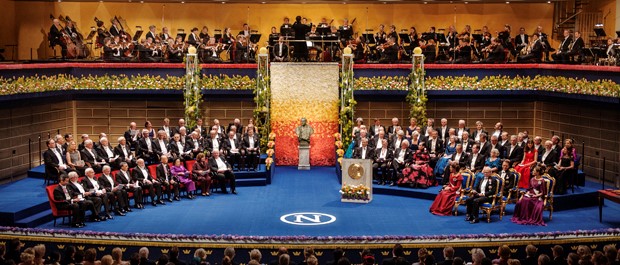What to expect when you're expecting a Nobel Prize
Professors Michael Rosbash and Jeff Hall are off to Sweden to receive their award. They're in for a week of elegant soirees, a white tails banquet and an audience with the king.
 Copyright @ Nobel Media AB 2016 Photo Alexander Mahmoud
Copyright @ Nobel Media AB 2016 Photo Alexander MahmoudThe Nobel Prize ceremony is the highlight of the festivities — when the best of the best in the world receive their awards.
For the next week, Brandeis biologists Michael Rosbash and Jeff Hall — two down-to-earth academics who spent much of their careers in labs surrounded by fruit flies — will be treated like Swedish royalty.
The two researchers, who won this year's Nobel Prize in Physiology or Medicine for their work on circadian rhythms, will arrive in Stockholm on December 5 for Nobel Week, a celebration of all the 2017 winners of the most prestigious awards on the planet. They will be accompanied by President Ron Liebowitz and his wife, Jessica.
Rosbash, the Peter Gruber Endowed Chair in Neuroscience, and Hall, a professor emeritus of biology, will be chauffeured around in a limousine, assigned a personal attaché from the Swedish government, and stay in the 5-star Grand Hôtel overlooking the Royal Palace and the Baltic Sea. The week culminates in an award ceremony at Stockholm Concert Hall where the men wear white tie and tails and the women evening gowns.
The prize ceremony will take place on December 10. (Brandeis will host a live viewing party in Levin Ballroom at 10:30 a.m. EST.) King Carl XVI Gustaf will hand out the gold Nobel medals and accompanying diplomas in accordance with a strict protocol: The awardees must bow three times, first to the king; next, to previous prize winners and prize committee members; and last, to the audience. After a trumpet blare tells the audience it's okay to applaud, Rosbash and Hall will return to their seats.
The pièce de résistance of the evening is a sumptuous banquet at City Hall. About 1,300 people attend; it's considered the social event of the year. A white-gloved staff spends hours beforehand laying out 6,730 pieces of porcelain, 5,384 glasses and 9,422 pieces of cutlery. Each year more than 23,000 flower arrangements are flown in from Sanremo, on the Italian Riviera, where Alfred Nobel spent the last years of his life.
The room is "gloriously decorated with flowers and candles," said Nancy Lurie Marks Professor of Neuroscience Leslie Griffith, who attended Nobel Week in 2014 as an invited guest.
The menu sets a standard for Swedish cuisine. Last year's dinner included charcoal-baked langoustine and scallop, served with nettles; ramson and pickled winter apples; and quail in black garlic and leek ash with Jerusalem artichoke.
Both the ceremony and banquet are broadcast live on Swedish TV. Watched by over a million people, the programs bear some resemblance to our Academy Awards. Announcers critique the guests' evening dresses. Female members of the royal family don magnificent tiaras. "The combination of genius, gold and gala makes these events fun to watch," says Annika Schildt '86, a Wien International Scholar who lives in Stockholm. She has been a guest four times. "The beauty of it all is sheer magic, especially the first time," she adds.
But this is all just the tip of the iceberg. Here are a few other highlights to look out for:
-
On December 6, Rosbash and Hall will visit the Nobel Museum and, as is the custom, donate an artifact of their choosing to the permanent collection. What it will be is still a secret.
-
The next day, the laureates each deliver 30-minute scientific lectures at the Karolinska Institute, one of the largest medical universities in the world. Michael Young of The Rockefeller University, who shared the Nobel with Rosbash and Hall, will also give a talk.
-
A concert at Stockholm Concert Hall will feature Gustavo Dudamel conducting the Royal Stockholm Philharmonic Orchestra in a program comprising Richard Strauss' "Also Sprach Zarathustra" and Wolfgang Amadeus Mozart's Jupiter Symphony (Symphony No. 41 in C Major, K 551).
-
The festivities close on December 11 with the Royal Banquet Dinner at the Royal Palace, a small, intimate affair for the laureates and the royal family.
Needless to say, the prize-winners don't usually get much sleep.
Categories: Research, Science and Technology





